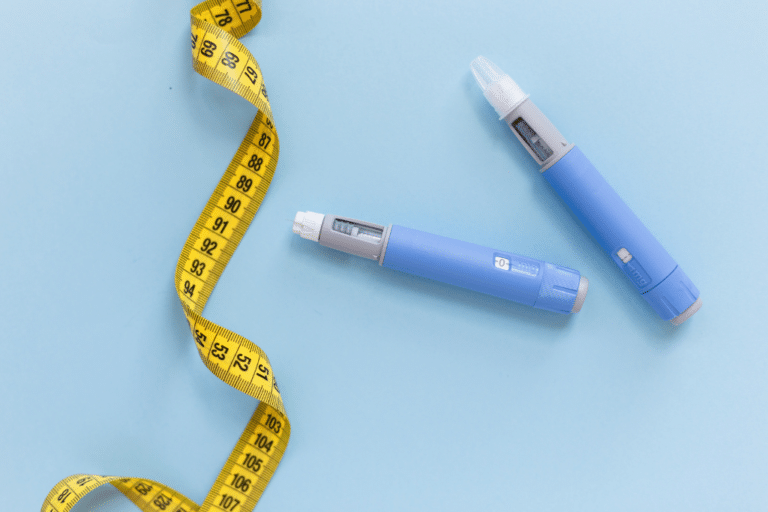In my last 2 posts, I’ve shared the first two steps of Writing Your Own Prescription for Hormone Harmony. You can read those posts here and here.
Step 3 is to support your body with vitamins, herbs and minerals that may be lacking. There are a number of potentially helpful supplements in perimenopause, but for today, I’ll cover my foundational favorites.
Vitamin C
Vitamin C can help raise progesterone levels. Low progesterone is one of the hallmark imbalances in perimenopause. It’s the only over-the-counter vitamin for low progesterone that’s proven to be effective. At doses of 750 mg/day, vitamin C has been shown to raise progesterone in women with both low progesterone and luteal phase defect. In a randomized trial, women were randomly assigned to receive either vitamin C or a placebo. Within three menstrual cycles, the group receiving vitamin C saw progesterone levels increase on average from 8 to 13 ng/mL (your goal is 10 to 25 ng/mL.) I generally recommend 1000 mg/day in divided doses.
Magnesium
If you’re a busy woman, chances are you’re deficient in magnesium and don’t even know it. This multi-tasking mineral is needed for your body to complete around 300 processes, many of which impact hormone balance, and it can be hard to get from food sources because of mineral depletions in soil.
Signs of Low Magnesium
- Muscle spasms from foot cramps to chest pain (always get chest pain checked out)
- Headaches
- Feeling constantly fatigued or weak
- Anxiety and edginess
- Loss of appetite
- Quick exhaustion during exercise. Research has found that during moderate activity, women with low magnesium levels in their muscle are likely to use more energy and tire far more quickly.
- Supplements are very effective for improving sleep quality and depth.
Magnesium can’t be manufactured as a single molecule, it needs to be bound to something else to be stable, so the biggest difference in different magnesium products comes not from the magnesium itself (which is all the same) but from the molecule it’s bonded to. The most common bonding agents are oxide, citrate, glycinate, taurate, sulfate, and threonate.
B-complex
The B vitamins, which include riboflavin, thiamine, niacin, B12, and folic acid, are often referred to as the “stress” vitamins. There are many symptoms of B vitamin deficiency, and these include hair loss, tension, irritability, difficulty managing stress, poor concentration, and anxiety. B vitamins have a complex role in your body, and are depleted by stress and some medications like birth control pills and stomach acid suppressors. Ensuring you have optimum levels during perimenopause can help in a number of ways to support stress management. I recommend the Nutrametrix brand because it is powdered and easy to swallow (mix with water), has a form of folate that does not require any conversion in case an MTHFR genetic variant is present and doesn’t have that objectionable smell that many B’s have.
[bctt tweet=”Supplements are helpful for counteracting the effects of stress which lie at the root of many hormone imbalances. #supplements #hormoneimbalance #perimenopause #VitaminB12 #folate #folicacid #stress #perimenopausesupplements #DrAnnaGarrett #AnnaGarrettAsheville” username=”DrAnnaGarrett”]
Vitex (AKA Chasteberry)
Chasteberry has been used for centuries to help with menstrual problems like PMS, irregular cycles, and low progesterone. There has been considerable research (mostly from Europe) suggesting the effectiveness of chasteberry in treating the symptoms of PMS, breast tenderness, and infertility related to elevated prolactin or low progesterone.
The therapeutic dose of chasteberry depends on the brand and the formulation you choose. Chasteberry is available in liquid, capsules, and tablets. Taking chasteberry while using the oral contraceptive pill, the contraceptive patch, or Nuvaring for birth control increases the chance that you could get pregnant. Allow several months for it to work. It may make cycles more irregular when you begin it.
Vitamin D with K2
Every cell in your body uses Vitamin D. Adequate Vitamin D intake is important for the regulation of calcium and phosphorus absorption, maintenance of healthy bones and teeth, and is suggested to provide a protective effect against diseases such as cancer, type-1 diabetes and multiple sclerosis.
The best way to get Vitamin D (which is actually a hormone) is by letting our skin convert sunlight to D3. Ten minutes of direct exposure without sunscreen is all you need daily. Even though it’s a short amount of time, it can be challenging to schedule this, especially if you live in an area that is cloudy a lot or has short days in the winter. I supplement with a Vitamin D product that also contains Vitamin K2, which helps the D3 do its job. D3 and K2 work together to prevent calcium from depositing in the lining of the main arteries in your neck that feed blood to your brain. Calcification of these arteries can lead to heart disease and stroke. I generally recommend 5,000 IU of Vitamin D3 daily along with at least 45 mcg of Vitamin K2 to my clients, with a goal Vitamin D level of 50-70 ng/mL. I recommend the Nutrametrix brand of this product.
Adaptogenic herbs
Adaptogenic herbs are safe, non-toxic herbs that support the adrenal glands, helping you respond to stress. They help regulate cortisol whether it’s high or low and are one of my main go-to supplements for clients. Adaptogenic herbs can be found as single herbs in tinctures or capsules. Many can also be made into teas. Some of my favorites include: rhodiola, panax ginseng, ashwagandha, eleutherococcus, licorice root, tulsi (holy basil), maca, and reishi mushrooms. The choice of which herb to use depends on the symptoms you are experiencing and I generally recommend blends of multiple adaptogens to my clients. Here’s one I like and use myself.
Perimenopause is a time when a little extra nutritional support can be helpful as you work on more foundational habit changes. Supplements are also helpful for counteracting the effects of stress which lie at the root of many hormone imbalances. I suggest trying no more than 1 or 2 new supplements at a time so you can assess the effects and quickly pinpoint any problems with side effects.
Dr. Anna Garrett is a menopause expert and Doctor of Pharmacy. She helps women who are struggling with symptoms of perimenopause and menopause find natural hormone balancing solutions so they can rock their mojo through midlife and beyond. Her clients would tell you that her real gift is helping them reclaim parts of themselves they thought were gone forever.
Find out more about working with her at https://www.drannagarrett.com/work-with-me/ or you can click the button below to schedule a call.




